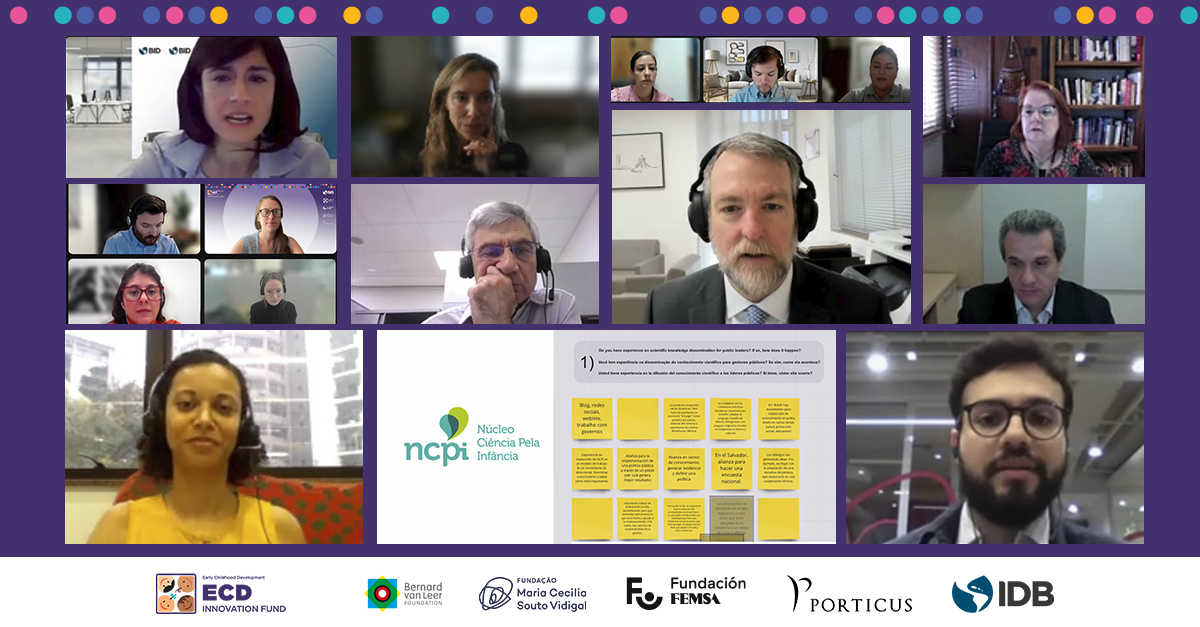What topics are critical for children? How to build bridges between scientific knowledge and public policies for early childhood? What lessons have we learned and what challenges lie ahead? These questions were addressed during the third workshop of the Community of Practice in Early Childhood Development (ECD), which focused on childhood policies in Brazil and on finding significant common ground among many countries in the region.
Based on the opening remarks of the IDB representative and the experience shared by the Scientific Committee of the Núcleo Ciência pela Infância (NCPI) of Brazil, more than 50 specialists and researchers, government representatives, project implementers, and innovators from Latin America, Tanzania, Sudan, and other latitudes exchanged their experiences and visions in a very rich and participatory conversation.
What key information was shared?
Morgan Doyle, BID representative in Brazil, emphasized the work or the Early Childhood Development Innovation Fund in the country:
- In Rio de Janeiro, an evaluation was conducted to analyze the medium-term impacts of attending childcare centers, showing that they improve primary school attendance.
- In Boa Vista, modeled after the Reach Up Jamaica Program, hybrid modalities were implemented during the pandemic to reach families when services were disrupted.
- In the city of Pelotas, the Piá Project is being developed to assess the impact of two parenting programs on child aggression as well as the cognitive and socioemotional development of children.
Priscila Costa, Head of Research and Innovation at NCPI, shared the institution’s strategies as a coalition focused on the production and dissemination of scientific content on early childhood development through different communication channels. She emphasized the effort to train scientists to translate their research evidence in an accessible way, providing tools for the implementation of comprehensive public policies addressing early childhood development.
Maria Beatriz Linhares, a researcher from NCPI’s Scientific Committee, highlighted data from NCPI’s recent work, “Preventing Violence against Children.” She stressed the cost and impact that violence has on children’s development and quality of life, emphasizing the importance of prevention across different types of violence (sexual, intrafamily, school-related, psychological, and physical). Key data are presented below:

Regarding the recommendations for addressing this issue, Professor Linhares highlighted that Brazil has a significant institutional and legal framework to tackle instances of violence. However, it remains crucial to work on the underlying causes and provide training to professional agents working in the fields of health, education, and justice. This training would enable them to promptly identify and respond to such situations. She also emphasized the need to develop strategies and responses to break the intergenerational cycle of violence against children, which is perpetuated from one generation to the next. Additionally, she identified prevention and strengthening of the protection network, along with the implementation of parenting programs, as the most effective approaches to break this cycle.
How can we integrate evidence and scientific knowledge into early childhood policies? Opinions from the community of practice members
During the event, participants were divided into different discussion groups to identify challenges and ideas related to incorporating scientific evidence into public work for childhood. Their main contributions were:
- It is crucial to generate knowledge and evidence to provide policymakers and decision-makers with qualified information.
- It is important for the evidence to be accompanied by action proposals that consider both technical and political levels.
- Clear dissemination strategies, to be executed through various communication channels, are essential. This dissemination process should be bidirectional: disseminating knowledge while understanding its impact.
- It is beneficial for experts to offer the acquired knowledge in the form of good practices and lessons learned about early childhood to decision-makers.
- Training is key to strengthening interventions and providing tools for the implementation of comprehensive public policies that address early childhood development.
Although participants shared specific challenges from their respective contexts, there was a consensus that creating recurrent spaces for dialogue and exchange between knowledge generators and program implementers is a key mechanism to put these ideas into practice. Additionally, they identified the need to constantly adapt the technical language of generated knowledge to make it accessible for policymakers and implementers. This allows for better communication of the potential impact of evidence on intervention and normalizes interaction among actors from different disciplines in the field of early childhood.
You can find these and some other shared ideas on this board. We invite you to join this conversation by sharing your work for early childhood using the hashtag #hubdesarrolloinfantil and leaving your comments below. Let’s stay in touch!
To learn more about various early childhood actors in the region, visit the Knowledge Hub on Early Childhood Development in Latin America and the Caribbean, a page with more than 2000 resources on early childhood, and a map presenting innovative projects in the region.
The Early Childhood Development Innovation Fund (ECDF) is an alliance between the Inter-American Development Bank (IADB), the FEMSA Foundation, the Maria Cecilia Souto Vidigal Foundation, Open Society Foundations, Porticus, and the Bernarda Van Leer Foundation that finances, designs, implements, and evaluates innovative and scalable solutions to improve the lives of children in Latin America and the Caribbean.


Leave a Reply